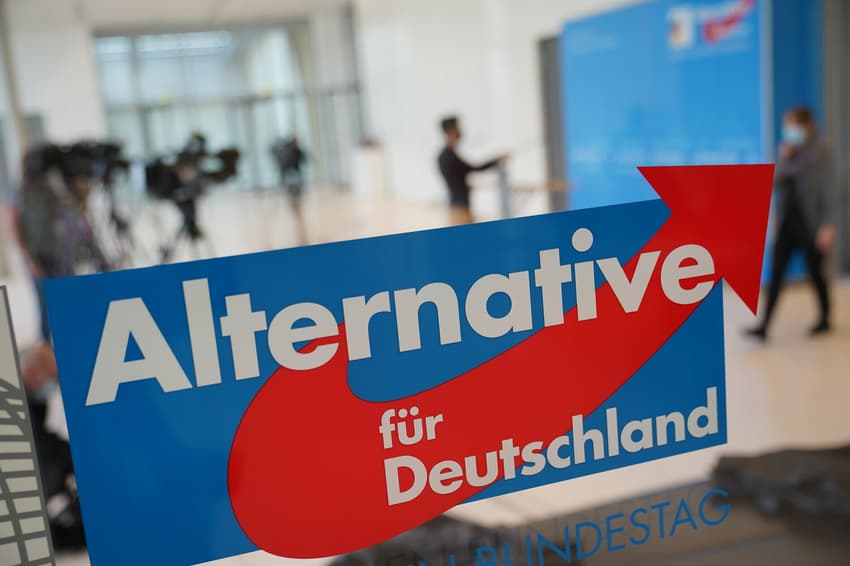German court blocks surveillance of far-right AfD

A German court on Friday ordered a temporary halt to plans by the domestic intelligence agency to place the far-right AfD
party under surveillance for posing a threat to democracy.
The Cologne administrative court ruled that the Federal Office for the Protection of the Constitution (BfV) had to wait for the outcome of a legal challenge brought by the AfD against its classification as a "suspected case" of right-wing extremism before any surveillance could start.
German media reported earlier this week that the BfV had decided to classify the anti-Islam, anti-immigrant AfD as a suspected extremist
organisation, which would allow it to begin spying on the party, but the decision was not officially communicated.
The court found that the BfV had "not taken sufficient care" to prevent the information from leaking to the press.
The publicity given to the planned surveillance had also interfered "in an unacceptable manner" with the AfD's constitutionally enshrined right "to equal opportunities among political parties" in a key election year, the court said.
AfD co-leader Joerg Meuthen hailed the court's temporary suspension as "a great victory for us" and mocked Germany's secret services "for failing to keep a secret".
The "suspected case" label, which comes after a two-year investigation into the AfD's links to extremists, would allow intelligence agents to shadow the party, tap its communications and possibly use undercover informants.
However, AfD lawmakers or candidates standing in this year's regional polls and September's general election would be excluded from the monitoring.
Founded in 2013, the Alternative for Germany party started out as an anti-euro outfit before capitalising on public anger over Chancellor Angela Merkel's 2015 decision to allow in a wave of refugees.
It took nearly 13 percent of the vote at the last general election in 2017, allowing it to enter the national parliament where it became the largest opposition party.
But with concerns about the migrant influx waning and the coronavirus pandemic roiling Germany, the AfD has fallen out of the spotlight and seen its popularity dry up in recent surveys.
The party has in the past courted controversy by calling for Germany to stop atoning for its World War II crimes.
Senior AfD figure Alexander Gauland once described the Nazi era as just "a speck of bird poo" on German history.
READ MORE: Far-right AfD party to be investigated over extremist links
Comments
See Also
The Cologne administrative court ruled that the Federal Office for the Protection of the Constitution (BfV) had to wait for the outcome of a legal challenge brought by the AfD against its classification as a "suspected case" of right-wing extremism before any surveillance could start.
German media reported earlier this week that the BfV had decided to classify the anti-Islam, anti-immigrant AfD as a suspected extremist
organisation, which would allow it to begin spying on the party, but the decision was not officially communicated.
The court found that the BfV had "not taken sufficient care" to prevent the information from leaking to the press.
The publicity given to the planned surveillance had also interfered "in an unacceptable manner" with the AfD's constitutionally enshrined right "to equal opportunities among political parties" in a key election year, the court said.
AfD co-leader Joerg Meuthen hailed the court's temporary suspension as "a great victory for us" and mocked Germany's secret services "for failing to keep a secret".
The "suspected case" label, which comes after a two-year investigation into the AfD's links to extremists, would allow intelligence agents to shadow the party, tap its communications and possibly use undercover informants.
However, AfD lawmakers or candidates standing in this year's regional polls and September's general election would be excluded from the monitoring.
Founded in 2013, the Alternative for Germany party started out as an anti-euro outfit before capitalising on public anger over Chancellor Angela Merkel's 2015 decision to allow in a wave of refugees.
It took nearly 13 percent of the vote at the last general election in 2017, allowing it to enter the national parliament where it became the largest opposition party.
But with concerns about the migrant influx waning and the coronavirus pandemic roiling Germany, the AfD has fallen out of the spotlight and seen its popularity dry up in recent surveys.
The party has in the past courted controversy by calling for Germany to stop atoning for its World War II crimes.
Senior AfD figure Alexander Gauland once described the Nazi era as just "a speck of bird poo" on German history.
READ MORE: Far-right AfD party to be investigated over extremist links
Join the conversation in our comments section below. Share your own views and experience and if you have a question or suggestion for our journalists then email us at [email protected].
Please keep comments civil, constructive and on topic – and make sure to read our terms of use before getting involved.
Please log in here to leave a comment.